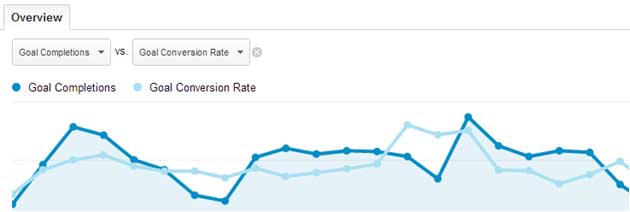Many online marketers get too wrapped up in measuring data that, though useful, is not the most important for understanding how your website is performing as a marketing channel.
I say that because each investment of your time, money, and people should have a very solid ROI expectation attached to it. Without ROI, there's no pot at the end of rainbow, so you have to focus on those activities/metrics that provide the largest gains.
Therefore, here are five online marketing metrics you should be looking at every day.
1. Conversion Rate
If your website asks visitors to...
- Pay for a product or service
- Sign up for an account
- Provide an email address in exchange for something
- Or take part in any other business engagement
...then it will have a conversion rate. And let's be very, very clear: The success of your online business is directly tied to how well your website is converting visitors to customers/subscribers.
Set up your goals in Google Analytics and monitor your conversion rate by going to Conversions > Goals > Overview

Monitoring your conversion rate every day will enable you to know what kind of messaging works best, what blog posts get you the most signups, and what color scheme is best at ensuring people subscribe for your newsletter.
Your best situation is when there is both high traffic and a high conversion rate. That is when you really should see what you've done, because you've done something right.
The easiest way of increasing your conversion rate is A/B testing, which means you split two versions of the same page to 50% of your visitors each and see which version is better at converting better. (A good intro to A/B testing is the Smashing Magazine article "The Ultimate Guide to A/B Testing.")
2. Average Pageviews per Visit
If you run a blog about your industry or niche, this is your second most important metric. Why? Because if people are not moving around reading more than one article, it's quite likely they were not impressed by the first. If you see your average pageviews per visit dropping, have a good look at what the most common landing pages are and what kind of content they present to the visitor.
A subset of this metric is your bounce rate, which is the number of people who come and leave after the first page. If your bounce rate is high, it's quite likely that the profile of visitors coming to your website is not the right match for you.
Be extra wary if they're coming from any of your PPC campaigns, because a high bounce rate could mean you're targeting the wrong visitor profile.
3. Backlink Profile
Backlink profile is all about from where you are getting your links. This is important to monitor because, just like the real world, Google too judges you on the friends you keep (or the people who link to you). For the average online business, bad friends are porn, gambling, pirated software, and other questionable sites.
In addition, the anchor text of links pointing to your site must look like natural, human written text. With search engines getting smarter by the day, having keyword links from SEO-only sites without any engagement will hurt your score.
4. Number of Return Visitors
Return visitors indicate one of the most important aspects of your blog: that it is useful to your target audience. And a blog readership that finds the content useful will soon become an engaged readership.
Once engaged, they'll happily share your content, get into conversations with you, spread the word about you, subscribe to your newsletter, recommend you to their friends and professional networks and when the need arises, even buy from you.
After starting a blog, if you see the number of visitors who return go up, pat yourself on the back, because you're doing things right.
5. Search Engine Queries and Landing Pages
Google is the most important source of qualified, interested traffic for most websites. Therefore, it is imperative for a blog or online business owner to understand where he or she ranks for the most relevant keywords, what are the queries through which visitors are coming to the website, and what are their landing pages.
This metric is important because it'll help you realize that some landing pages are really good at promoting further engagement, conversions, and pageviews, while some are not.
By analyzing the queries and their respective landing pages, you'll know what works for you and your audience, providing you direction about what kind of content you should generate for what kind of visitor.
And, Finally, What Metrics Do You Use?
Although those are some relevant metrics to watch, I'm sure you have some of your own that you use that are relevant to your business. Let's discuss them in the comments.




